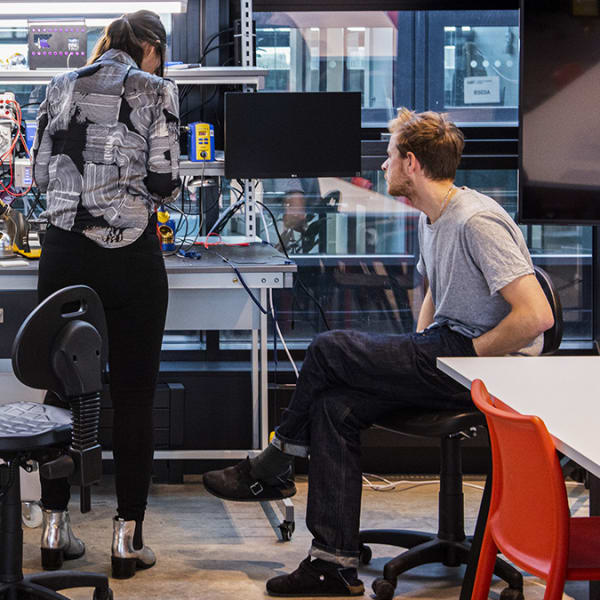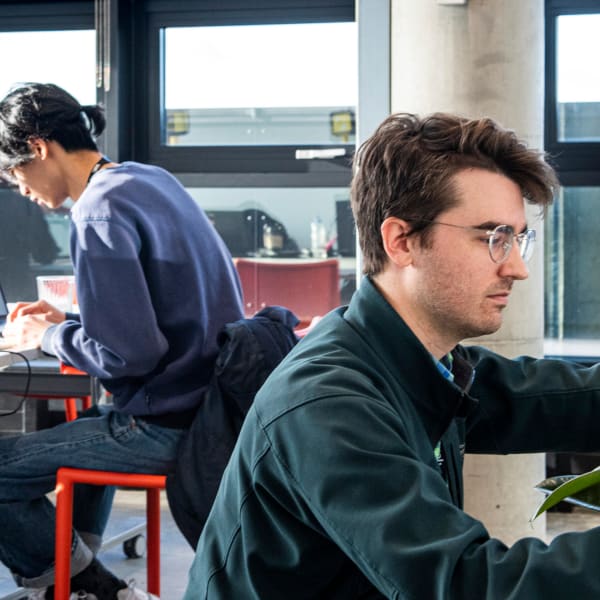Course units
Term 1 Units:
Intersectional Internets (20 Credits)
Critically explore how inequalities present in offline spaces are mirrored and often amplified within digital environments. Through an intersectional lens, you will investigate the structural, technical, and cultural aspects of internet technologies across all full stack layers – data, archives, infrastructure, tools, access, and experience – and consider how these layers intersect with race, gender, class, and other identities, often perpetuating bias, exclusion, and inequality. By engaging with key readings, real-world case studies with practical design responses, you will develop tools to critically assess and address digital inequalities from an intersectional perspective, positioning design as a powerful medium for change.
Critical Coding Practices (20 credits)
This unit complements the Intersectional Internets unit, providing you with practical skills to engage directly with the technical processes behind the digital systems you have critically examined. You will be introduced to the fundamentals of coding not as a single skill but as a layered process across the back-end, middle layer, and front-end, each contributing to the function and structure of the internet. By learning to work with different components of a digital system, you will develop the basic computational knowledge to critically assess and understand the complex architectures that shape internet inequalities. You will gain a foundational understanding of coding principles and practices in the context of free and collaborative development cultures with open-source tools and frameworks. You will have the opportunity to experiment with building small systems and tools to inform your ongoing engagement with equity and accessibility in digital technology.
Term 2 Units:
Computational Inequalities (20 Credits)
This unit examines how inequality is structured into computational systems through full stack layers such as data, archives, infrastructure, code, algorithms, and interfaces. Computation is approached not as an isolated technical skill, but as a practice that connects full stack design with social and ethical responsibility. You will develop a systems-level understanding of how these layers function together, and how design and technical decisions across the stack can reproduce or challenge existing forms of inequality – both offline and online – through the use of open, crowdsourced data and technologies to support more equitable system design. Engaging with concepts such as surveillance capitalism, big data, and machine learning, you will study how computational systems are built, how data is collected and processed, and how computational processes influence access, visibility, and participation. By the end of this unit, you will produce a technical prototype and accompanying reflective documentation that demonstrates your ability to analyse, design, and intervene in computational systems with critical awareness.
Designing for Social Change (20 Credits)
Explore how design, grounded in technology, can serve as a catalyst for social change with equity and justice as central goals. You will examine the cultural, political and ethical dimensions of design by engaging with contemporary frameworks and theories that address injustices and inequalities through a technological lens. You will learn to view technology not only as a tool for executing design but also as a critical instrument that influences the social impact of design interventions. As you progress, you will apply these frameworks in reflective exercises, targeted projects, and case study analysis, developing hands-on skills that enable you to critically assess the impact of technological choices in design. You will be equipped to understand design as a transformative tool and propose a set of design criteria and principles for creating social change.
Term 3 Units:
Platform Potentials (20 Credits)
Examine how digital platforms operate within socio-political contexts and explores strategies to leverage them for large-scale, sustainable impact. You will engage with the broader systemic role of digital platforms in shaping societal structures, public policy, and long-term social change. Having already developed a foundation in full stack architecture, ethical design, and high-fidelity prototyping, you will now explore platforms as expansive ecosystems. You will gain the tools to design platform-based interventions that engage with systemic inequalities, considering factors like policy, community governance, and ethical frameworks.
Methods for Equitable Technology Development (20 credits)
This unit integrates advanced research methods with practical, ethical design approaches to create technology that is inclusive, responsible, and community-centred. Building on foundational skills in coding, design, and analysis, you will learn to apply research techniques that reveal diverse user contexts, address systemic inequities, and identify ethical considerations. At each stage, ethics is embedded as a guiding principle – whether gathering data, involving communities, or assessing impact. Through a combination of qualitative research, participatory design, and critical evaluation informed by frameworks such as Participatory Action Research, Critical Art, Design and Technical Practice, Feminist, postcolonial and anarchist Human Computer Interaction, Iterative/Experimental Design, and Digital ethnography, you will develop the skills to create technology that not only meets user needs but also upholds standards of justice, transparency, and accountability. You will prepare a case study with a critique of the methods learned throughout the unit, presented as a final report that demonstrates your ability to apply ethical methods in designing equitable technology solutions.
Term 4 Units:
Internet Equalities Final Project (60 Credits)
Your final project will take the form of practice-led or practice-based research with a technical prototype of a minimum viable product or an artefact that advances internet equality.










